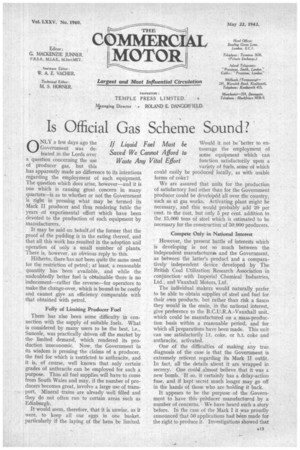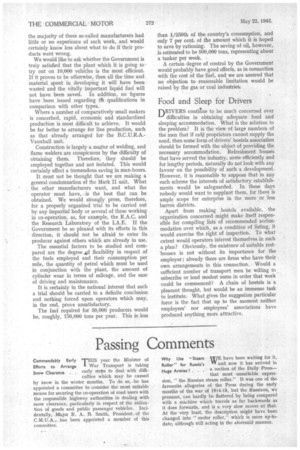Is Official Gas Scheme Sound?
Page 15

Page 16

If you've noticed an error in this article please click here to report it so we can fix it.
ONLY a few days ago the Government was defeated in the Lords over a question concerning the use of producer gas, but this has apparently made no difference to its intentions regarding the employment of such equipment. The question which .does arise, however—and it is one which is causing great concern in many quarters—is as to whether or not the Government is right in pressing what may be termed its Mark II producer and thus rendering futile the years .of experimental effort which have been devoted to the production of such equipment by manufacturers.
It may be said on behalf ,of the former that the proof of the pudding is in the eating thereof, and that all this work has resulted in the adoption and operation of only a small number of plants. There is, however, an obvious reply to this.
Hitherto, there has not been quite the same need for the restriction of petrol ; at least, a reasonable quantity has been available, and while the undoubtedly better fuel is obtainable there is no inducement—rather the reverse—for operators to make the change-over, which is bound to be costly and cannot give an efficiency comparable with that obtained with petrol.
Folly of Limiting Producer Fuel There has also been some difficulty in connection with the supply of suitable fuels. What is considered by many users to be the best, i.e., Suncole, was practically driven off the market by the limited demand, which rendered its production uneconomic. Now, the Government in its wisdom is pressing the claims of a producer, the fuel for which is restricted to anthracite, and it is, of course, well known that only certain grades of anthracite can be employed for such a purpose. Thus all fuel supplies will have to come from South Wales and may, if the number of producers becomes great, involve a large use of transport. Mineral trains are already well filled and they do not often run to certain areas such as Edinburgh.
It-would seem, therefore, that it is unwise, as it were, to keep all our eggs in one basket, particularly if the laying of the hens be limited. Would it not be'better to entourage the employment of some equipment which can function satisfactorily upon a variety of fuels, some of which could easily be produced locally, as with usable forms of coke?
We are assured that units for the production of satisfactory fuel other than for the Government producer could be developjd all over the country, such as at gas works. Activating plant might be necessary, and this would probably add 20 per cent, to the cost, but only 5 per cent. addition to the 15,000 tons of steel which is estimated to be necessary for the construction of 50,000 producers.
Compete Only in National Interest However, the present battle of interests which is developing is not so much between the independent manufacturers and the Government, as between the latter's product and a comparatively independent device developed by The British Coal Utilization Research Association in conjunction' with Imperial Chemical Industries, Ltd., and Vauxhall Motors, Ltd.
The individual makers would naturally prefer to be able to obtain supplies of steel and fuel for their own products, but rather than risk a fiasco they would in the main, in the national interest, give preference to• the B.C.U.R.A.-Vauxhall unit, which could be manufactured on a mass-production basis within a reasonable period, and for which all Preparations have been made. This unit can use satisfactorily 1.t. coke, or h.t. coke and anthracite, activated.
One 'of the difficulties of making any true diagnosis of the case is that the Government is extremely reticent regarding its Mark II outfit. In fact, all the details about it are wrapped in secrecy. One could almost believe that it was a new bomb. If so, it certainly has a delay-action fuse, and if kept secret much longer may go off in the hands of those who are holding it back.
It appears to be the purpose of the Government to have this prnducer manufactured by a number of concerns. We have heard such a story before. In the case of the Mark I it was proudly announced that 50 applications had been made for the right to produce it. Investigations showed that the majority of these so-called manufacturers had little or no experience of such work, and would certainly know less about what to do if their products went wrong.
We would like to ask whether the Government is truly satisfied that the plant which it is going to try out on 10,000 vehicles is the most efficient. If it proves to be otherwise, then all the time and material spent in developing it will have been wasted and the vitally important liquid fuel will not have been saved. In addition, no figures have been issued regarding if§ qualifications in comparison with other types.
Where a number of comparatively small makers is concerried, rapid, economic and standardized production is most difficult to achieve. It would be far better to arrange for line production, such as that already arranged for the B.C.U.R.A.Vauxhall unit.
Construction is largely a matter of welding, and flame welders are conspicuous by the difficulty of obtaining them. Therefore, they should be employed together and not isolated. This would certainly effect a tremendous saving in man-hours.
It must not be thought that we are making a general condemnation of the Mark II unit. What the other manufacturers want, and what the operator must have, . is the best that can be obtained. We would strongly press, therefore, for a properly organized trial to be carried out by any impartial body or several of these working in co-operation, as, for example, the R.A.C. and the Research Laboratory of the I.A.E. If the Government be so pleased with its efforts in this direction, it should not be afraid to enter its producer against others which are already in use.
The essential factors to be studied and compared are the degree ,gf flexibility in respect of the fuels employed and their consumption per mile, the quantity of petrol which must be used in conjunction with the plant, the amount of cylinder wear in terms of mileage, and the ease of driving and maintenance.
It is certainly in the national interest that such a trial should be carried to a definite conclusion and nothing forced upon operators which may, in the end, prove unsatisfactory.
The fuel required for 50,000 producers would be, roughly, 750,000 tons per year. This is less than 1/250th of the, country's consumption, and only 7 per cent. of the amount which it is hoped to save by rationing. The saving of oil, however, is estimated to be 500,000 tons, representing about a tanker per week.
A certain degree of control by the Government would probably have good effects, as in connection with the cost of the fuel, and we are assured that no objection to reasonable limitation would be raised by the gas or coal industries.
Food and Sleep for Drivers
DRIVER S contirlue to be much concerned over difficulties in obtaining adequate food and sleeping accommodation. What is the solution to the problem? It is the view of large numbers of the men that if cafe proprietors cannot supply the need, then some form of drivers' hostels association should be formed with the object of providing the necessary accommodation. Refreshment houses that have served the industry, some efficiently and for lengthy periods, naturally do not look with any favour on the possibility of such a development. However, it is reasonable to suppose that in any such scheme the interests of satisfactory establishments would be safeguarded. In these days nobody would want to supplant them, for there is ample scope for enterprise in the more or less barren districts.
Apart from making hostels available, the organization concerned might make itself responsible for compiling lists of recommended accbmmodation over which, as a condition of listing, it would exercise the right of inspection. To what extent would operators interest themselves in such a plan? Obviously, the existence of suitable rest-houses is not without its importance for the employer ; already there are firms who have their own arrangements in this connection. Would a sufficient number of transport men be willing to subscribe or lend modest sums in order that work could be commenced? A chain of hostels is a pleasant thought, but would be an immense task to institute. What gives the suggption particular force is the fact that up to the moment neither employers' nor employees' associations have produced anything more attractive.




















































